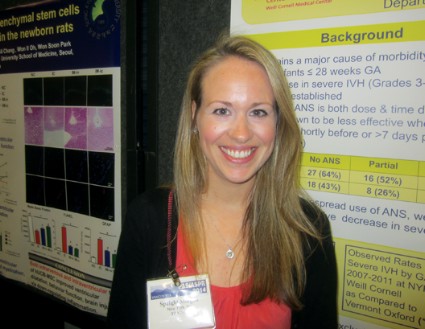User login
VANCOUVER, B.C. – Indomethacin helps prevent intraventricular hemorrhages in infants born before 29 weeks to mothers who do not receive a full course of antenatal steroids, according to a small study at Weill Cornell Medical College in New York.
The study included 72 infants born at an average weight of 866 g and 26 weeks’ gestational age. Among the 17 born without optimal maternal courses of antenatal steroids (ANS), the investigators found that just one of eight children dosed with indomethacin developed a severe brain bleed, compared with six of nine who did not get indomethacin. The nonsteroidal anti-inflammatory drug was dosed in the first 6 hours of life – and continued every 24 hours for a total of three doses, if tolerated – at 0.1 mg/kg; it significantly reduced the risk of intraventricular hemorrhage (odds ratio, 14; 95% confidence interval, 1.73-172; P = .04).
"The administration of indomethacin to premature infants born at 28 weeks or less in the absence of optimal ANS almost eliminated severe IVH [intraventricular hemorrhage] over a 2- year period," concluded the investigators, led by neonatologist Dr. Morgan Spaight, a fellow at Cornell.
"Most of the time, infants [there] get complete ANS courses" when indicated, "and we’ve seen a huge decline in our rates of severe intraventricular hemorrhages. At the same time, we are still seeing born infants that we need to shunt for post-hemorrhagic hydrocephalus; a majority of them were not exposed to antenatal steroids, either at all or [not completely]. This may be the first time indomethacin has been targeted for infants that did not receive optimal antenatal steroids," she said at the annual meeting of the Pediatric Academic Societies.
"We implemented a plan to target these infants specifically" with indomethacin. "We found that it significantly decreased the amount of severe IVH, although there are times we can’t complete the three doses because we are worried about adverse events," such as spontaneous intestinal perforation, she said.
Earlier studies have questioned the long-term benefit of indomethacin, but "there’s a pretty strong connection between severe IVH and bad outcomes, so we feel that preventing" it with indomethacin, when women don’t get a full course of ANS, "has to be a good thing," she said.
Infants who received indomethacin were born, on average, earlier than those who did not (24 vs. 27 weeks) and at lower average weights (652 vs. 972 g).
Dr. Spaight had no disclosures, and the work had no outside funding.
The 1994 landmark study by Dr. Laura Ment showed that a low dose of indomethacin given in the early hours of life to very preterm babies reduced the risk of severe intracranial hemorrhage (Pediatrics 1994;93:543-50). However, long-term follow-up studies have not shown better outcomes overall, leading neonatologists to wonder if there is a subset of very preterm babies who would benefit most from this treatment. This study suggests that infants who were not exposed to antenatal steroids might be such a subset, said Dr. James Cummings.
"The findings of this study help us define a population who might benefit most, suggesting that very preterm infants not exposed to antenatal steroids, or only to a partial dose of steroids, may be a target group for postnatal indomethacin prophylaxis," he said.,
"This very interesting study is consistent with what we know, and if these findings can be confirmed in prospective trials, will help us refine our approach," Dr. Cummings concluded.
Dr. Cummings is vice chair of pediatrics at Albany (N.Y.) Medical College, and a member of the American Academy of Pediatrics committee of the fetus and newborn. Dr. Cummings, who was asked to comment on the study, said he had no relevant financial disclosures.
The 1994 landmark study by Dr. Laura Ment showed that a low dose of indomethacin given in the early hours of life to very preterm babies reduced the risk of severe intracranial hemorrhage (Pediatrics 1994;93:543-50). However, long-term follow-up studies have not shown better outcomes overall, leading neonatologists to wonder if there is a subset of very preterm babies who would benefit most from this treatment. This study suggests that infants who were not exposed to antenatal steroids might be such a subset, said Dr. James Cummings.
"The findings of this study help us define a population who might benefit most, suggesting that very preterm infants not exposed to antenatal steroids, or only to a partial dose of steroids, may be a target group for postnatal indomethacin prophylaxis," he said.,
"This very interesting study is consistent with what we know, and if these findings can be confirmed in prospective trials, will help us refine our approach," Dr. Cummings concluded.
Dr. Cummings is vice chair of pediatrics at Albany (N.Y.) Medical College, and a member of the American Academy of Pediatrics committee of the fetus and newborn. Dr. Cummings, who was asked to comment on the study, said he had no relevant financial disclosures.
The 1994 landmark study by Dr. Laura Ment showed that a low dose of indomethacin given in the early hours of life to very preterm babies reduced the risk of severe intracranial hemorrhage (Pediatrics 1994;93:543-50). However, long-term follow-up studies have not shown better outcomes overall, leading neonatologists to wonder if there is a subset of very preterm babies who would benefit most from this treatment. This study suggests that infants who were not exposed to antenatal steroids might be such a subset, said Dr. James Cummings.
"The findings of this study help us define a population who might benefit most, suggesting that very preterm infants not exposed to antenatal steroids, or only to a partial dose of steroids, may be a target group for postnatal indomethacin prophylaxis," he said.,
"This very interesting study is consistent with what we know, and if these findings can be confirmed in prospective trials, will help us refine our approach," Dr. Cummings concluded.
Dr. Cummings is vice chair of pediatrics at Albany (N.Y.) Medical College, and a member of the American Academy of Pediatrics committee of the fetus and newborn. Dr. Cummings, who was asked to comment on the study, said he had no relevant financial disclosures.
VANCOUVER, B.C. – Indomethacin helps prevent intraventricular hemorrhages in infants born before 29 weeks to mothers who do not receive a full course of antenatal steroids, according to a small study at Weill Cornell Medical College in New York.
The study included 72 infants born at an average weight of 866 g and 26 weeks’ gestational age. Among the 17 born without optimal maternal courses of antenatal steroids (ANS), the investigators found that just one of eight children dosed with indomethacin developed a severe brain bleed, compared with six of nine who did not get indomethacin. The nonsteroidal anti-inflammatory drug was dosed in the first 6 hours of life – and continued every 24 hours for a total of three doses, if tolerated – at 0.1 mg/kg; it significantly reduced the risk of intraventricular hemorrhage (odds ratio, 14; 95% confidence interval, 1.73-172; P = .04).
"The administration of indomethacin to premature infants born at 28 weeks or less in the absence of optimal ANS almost eliminated severe IVH [intraventricular hemorrhage] over a 2- year period," concluded the investigators, led by neonatologist Dr. Morgan Spaight, a fellow at Cornell.
"Most of the time, infants [there] get complete ANS courses" when indicated, "and we’ve seen a huge decline in our rates of severe intraventricular hemorrhages. At the same time, we are still seeing born infants that we need to shunt for post-hemorrhagic hydrocephalus; a majority of them were not exposed to antenatal steroids, either at all or [not completely]. This may be the first time indomethacin has been targeted for infants that did not receive optimal antenatal steroids," she said at the annual meeting of the Pediatric Academic Societies.
"We implemented a plan to target these infants specifically" with indomethacin. "We found that it significantly decreased the amount of severe IVH, although there are times we can’t complete the three doses because we are worried about adverse events," such as spontaneous intestinal perforation, she said.
Earlier studies have questioned the long-term benefit of indomethacin, but "there’s a pretty strong connection between severe IVH and bad outcomes, so we feel that preventing" it with indomethacin, when women don’t get a full course of ANS, "has to be a good thing," she said.
Infants who received indomethacin were born, on average, earlier than those who did not (24 vs. 27 weeks) and at lower average weights (652 vs. 972 g).
Dr. Spaight had no disclosures, and the work had no outside funding.
VANCOUVER, B.C. – Indomethacin helps prevent intraventricular hemorrhages in infants born before 29 weeks to mothers who do not receive a full course of antenatal steroids, according to a small study at Weill Cornell Medical College in New York.
The study included 72 infants born at an average weight of 866 g and 26 weeks’ gestational age. Among the 17 born without optimal maternal courses of antenatal steroids (ANS), the investigators found that just one of eight children dosed with indomethacin developed a severe brain bleed, compared with six of nine who did not get indomethacin. The nonsteroidal anti-inflammatory drug was dosed in the first 6 hours of life – and continued every 24 hours for a total of three doses, if tolerated – at 0.1 mg/kg; it significantly reduced the risk of intraventricular hemorrhage (odds ratio, 14; 95% confidence interval, 1.73-172; P = .04).
"The administration of indomethacin to premature infants born at 28 weeks or less in the absence of optimal ANS almost eliminated severe IVH [intraventricular hemorrhage] over a 2- year period," concluded the investigators, led by neonatologist Dr. Morgan Spaight, a fellow at Cornell.
"Most of the time, infants [there] get complete ANS courses" when indicated, "and we’ve seen a huge decline in our rates of severe intraventricular hemorrhages. At the same time, we are still seeing born infants that we need to shunt for post-hemorrhagic hydrocephalus; a majority of them were not exposed to antenatal steroids, either at all or [not completely]. This may be the first time indomethacin has been targeted for infants that did not receive optimal antenatal steroids," she said at the annual meeting of the Pediatric Academic Societies.
"We implemented a plan to target these infants specifically" with indomethacin. "We found that it significantly decreased the amount of severe IVH, although there are times we can’t complete the three doses because we are worried about adverse events," such as spontaneous intestinal perforation, she said.
Earlier studies have questioned the long-term benefit of indomethacin, but "there’s a pretty strong connection between severe IVH and bad outcomes, so we feel that preventing" it with indomethacin, when women don’t get a full course of ANS, "has to be a good thing," she said.
Infants who received indomethacin were born, on average, earlier than those who did not (24 vs. 27 weeks) and at lower average weights (652 vs. 972 g).
Dr. Spaight had no disclosures, and the work had no outside funding.
AT THE PAS ANNUAL MEETING
Top clinical point: Indomethacin appears to help prevent intraventricular hemorrhage in preemies whose moms don’t receive a full course of antenatal steroids.
Major finding: When mothers don’t get a full dose of antenatal steroids, indomethacin delivered to their infants reduces the risk of intraventricular hemorrhage (odds ratio, 14; 95% confidence interval, 1.73-172; P = .04).
Data source: Outcomes of 72 infants born earlier than 29 weeks’ gestational age
Disclosures: Dr. Spaight had no disclosures, and the work received no outside funding.

